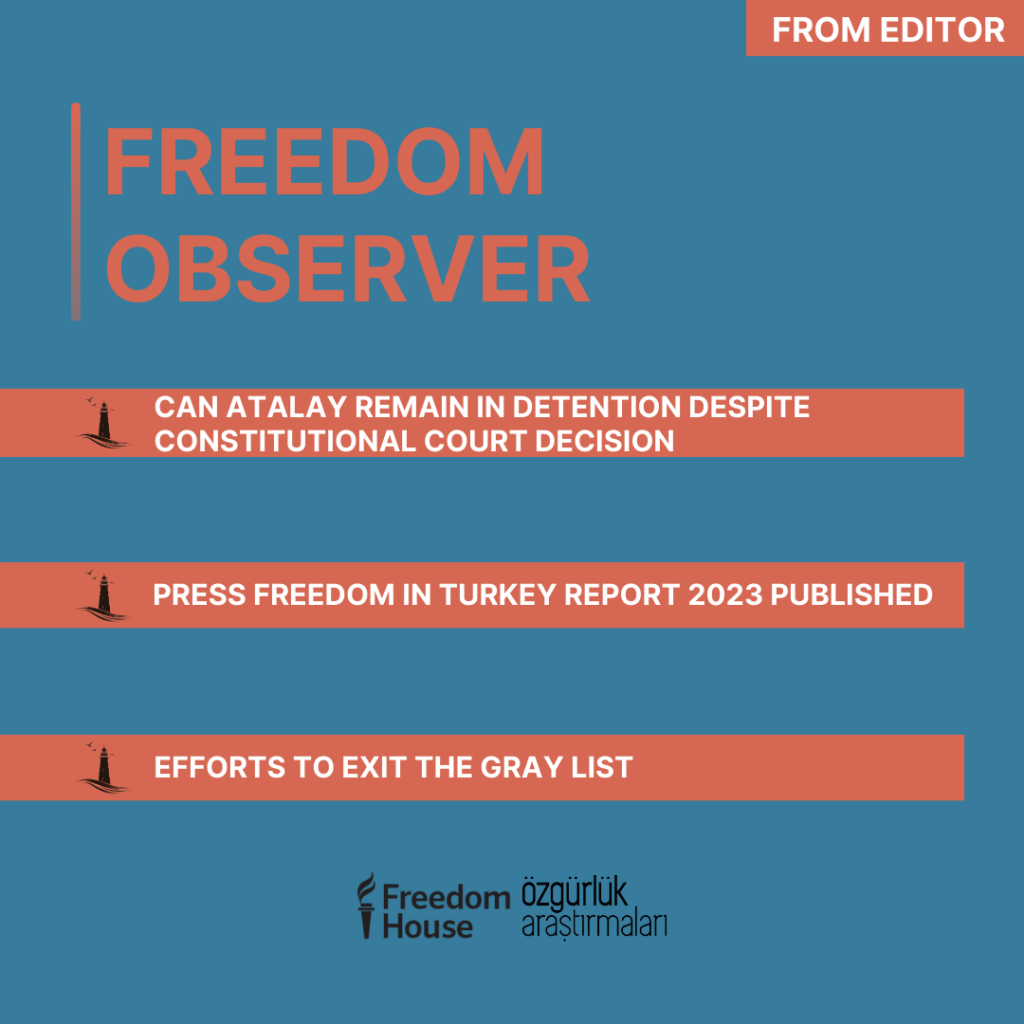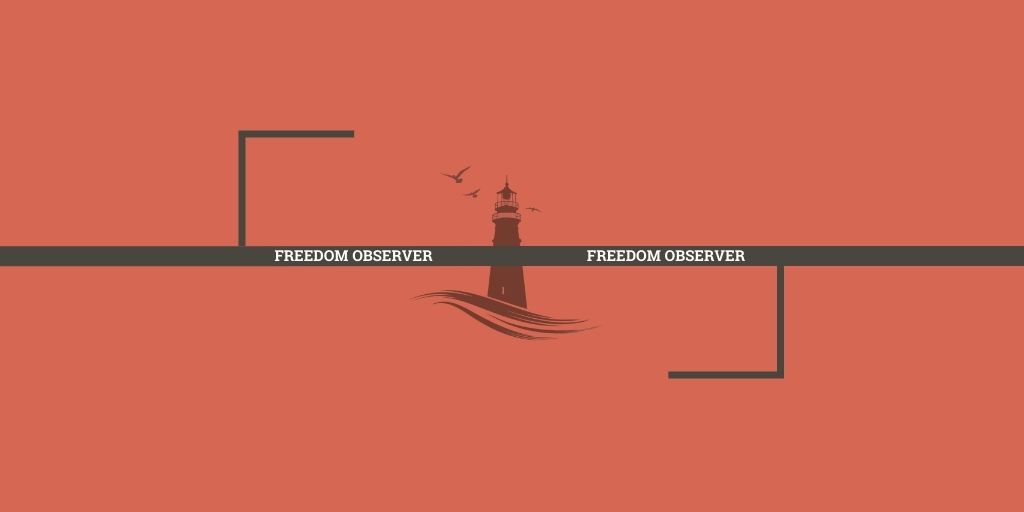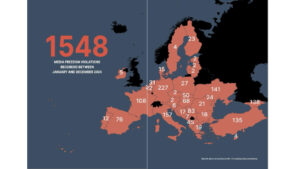
From Editor – in- Chef
Turkey’s dynamic agenda remains active this week, challenging for even those attempting to keep up in fast-forward mode. The repercussions of the 38th Ordinary Congress of the Republican People’s Party (CHP) are expected to resonate in public discourse for an extended period. Kemal Kılıçdaroğlu’s 13 years and 167 days as the CHP chairman and prominent opposition leader concluded in the early hours of November 5. In the congress’s second round, Özgür Özel, the candidate representing the advocates for change, secured the votes of 812 delegates, becoming the 8th CHP chairman. While the intricacies of this transition will be explored further in upcoming editions of the Freedom Observer, it is undeniably a significant and valuable shift. This is particularly noteworthy in the Turkish political landscape, where many political parties lack robust internal party democracy. Given the prevalent influence of a leader’s authority in the Turkish political system, replacing a chairman through a congress/assembly is noteworthy, irrespective of the outcome.
After emphasizing that this development will be more comprehensively evaluated in future editions of the Freedom Agenda, we can now delve into other topics in this week’s Turkey. Turkey, accustomed to practices undermining the rule of law, witnessed another legal scandal last week. Despite the Constitutional Court’s clear violation of rights, Turkish Workers’ Party Hatay MP Can Atalay, expected to be released, remains in detention. In this edition of the Freedom Observer, Assoc. Prof. Dr. Ali Rıza Çoban discusses the non-implementation of the Constitutional Court’s decision on Can Atalay by the lower court. Ömer Faruk Şen provides details from the Press Freedom in Turkey Report, authored by Prof. Dr. Burak Bilgehan Özpek. The final topic in this edition of the Freedom Agenda is the economy, where Enes Özkan comments on Turkey’s endeavors to be removed from the Gray List to attract foreign investors.
I hope to meet you in the next Freedom Observer.
* Dr. Nurettin Kalkan
Can Atalay Remain in Detention Despite Constitutional Court Decision
Lawyer Can Atalay was tried alongside other defendants in the Gezi trial, sentenced to 18 years in prison, and arrested following his conviction. While the lower court’s decision was under appeal before the Supreme Court of Appeals, the Workers’ Party of Turkey nominated Can Atalay, still under arrest, as a parliamentary candidate from Hatay. Atalay was elected as an MP in the May 14, 2023 elections. Following this, Atalay petitioned the Court of Cassation for his release, asserting that he had acquired legislative immunity in accordance with Article 83 of the Constitution. Therefore, he argued that the trial against him should be postponed until the end of his parliamentary term. Despite precedent decisions by the Constitutional Court in similar cases, the 3rd Criminal Chamber of the Court of Cassation rejected Atalay’s requests for a stay of proceedings and release. Subsequently, Atalay submitted an individual application to the Constitutional Court, claiming that his constitutional rights had been violated.
Subsequently, the Chief Public Prosecutor’s Office of the Court of Cassation expressed its support for upholding the conviction against Atalay in a communiqué. Despite the Constitutional Court indicating that Atalay’s application was on the agenda during its meeting on October 12, 2023, the 3rd Criminal Chamber of the Court of Cassation announced its decision on the Gezi trial on September 28, 2023, confirming the conviction against Can Atalay. Consequently, Atalay’s sentence became final. During its meeting on October 12, the Constitutional Court declared a postponement of the examination of the application to a later date, citing that one of its members was unable to prepare the file. The Court eventually included Atalay’s application on the agenda on October 25 and delivered its decision, publishing the reasoned judgment in the Official Gazette on October 27.[1]
Referring to its earlier decisions on Enis Berberoğlu,[2] Ömer Faruk Gergerlioğlu,[3] and Leyla Güven,[4] the Constitutional Court determined that Can Atalay’s right to vote and be elected and his right to liberty and security were violated because he was not released after being elected as an MP. In arriving at this conclusion, the Court emphasized that the provision governing the exception to legislative immunity in Article 83 of the Constitution refers to Article 14 of the Constitution and specifies that those who have already been prosecuted for crimes covered by this article cannot benefit from immunity. However, Article 14 of the Constitution does not specify any particular type of crime; it solely regulates the prohibition of abusing the right.
Therefore, recalling that Article 14 of the Constitution imposes a duty on the legislature to regulate which crimes cannot benefit from legislative immunity, the Court asserted that in the absence of such clear regulations, judicial bodies cannot determine which crimes are excluded from the scope of immunity through interpretation. Such a determination would be unpredictable and arbitrary. Consequently, the Court held that the interference with constitutional rights did not meet the conditions of legal foreseeability. The Court not only identified a violation but also explained how the violation would be remedied. According to this,
To put an end to the rights violations identified by the Constitutional Court against the applicant and to eliminate their consequences:
i. Commencement of retrial proceedings,
ii. Suspension of the execution of the conviction and release from the penal institution,
iii. Termination of the applicant’s convicted status,
iv. Ordering a stay in the retrial.
It is mandatory to fulfill these procedures above.[5]
As evident, the Constitutional Court explicitly outlined in its judgment the decisions that the local court should undertake and forwarded a copy of the judgment to the Istanbul 13th High Criminal Court, the court of first instance, to implement the judgment’s requirements. While the local court should have promptly released Atalay upon receiving the Constitutional Court’s summary judgment, it instead awaited the reasoned verdict. Additionally, no decision was made for five days after the reasoned verdict was published.
The series of unlawful events that have persisted since the initiation of this case has now reached its peak with the arbitrary non-implementation of the Constitutional Court’s decision. Although the local court possesses the authority to initiate a retrial for a finalized sentence, the maneuvers to avoid implementing the Constitutional Court’s binding decision, as stipulated by Article 153 of the Constitution for legislative, executive, and judicial bodies, cannot be considered based on a legal interpretation. In a normal rule-of-law state, such arbitrariness should carry legal consequences.
* Ali Rıza Çoban – Constitutional Lawyer
Press Freedom in Turkey Report 2023 Published
The Freedom Research Association has consistently released annual reports on Freedom of the Press in Turkey since 2015. These reports, regularly authored by Prof. Dr. Burak Bilgehan Özpek, offer comprehensive insights into the challenges, constraints, and freedoms encountered by the press and journalists in Turkey. They provide an overview of the current state of the media landscape. The recently published Freedom of the Press in Turkey Report 2023 sheds light on the issues confronting the media in Turkey, addressing significant matters related to press freedom. Özpek organizes the report into three main sections: “legal framework,” “economic dependency,” and “polarization and lynching.”
The initial segment of the report highlights that while the number of imprisoned journalists has decreased compared to the previous year, the figure remains considerably high at 37, with a notable majority being Kurdish journalists. Prominent figures such as Mercan Yanardağ and Barış Pehlivan are among those affected. The section also notes that, in 2023, no media outlets faced legal closures; however, it underscores the closure or transition to digital media by numerous national and local newspapers due to financial crises. Although no media outlets were officially shut down by court order this year, many experienced administrative fines and publication suspension penalties, issues frequently covered in our bulletins.
Özpek categorizes the channels based on their broadcasting policies as “opposition” and “pro-government,” revealing that channels with opposition broadcasting policies faced 53 fines. In contrast, channels with pro-government broadcasting policies encountered only 5 fines. Administrative fines amounted to 17 million 335 thousand TL for opposition channels, while pro-government channels incurred only 1 million 674 thousand TL in administrative fines.
The report also highlights that RTÜK, extending its reach beyond traditional media, has targeted digital platforms such as Netflix and Disney+, imposing millions of lira in administrative fines on these platforms. In this section, the report underscores the impact of bans on websites and social media platforms, noting that over 700 thousand domain names and 55 thousand tweets were restricted. It emphasizes that these numbers gained momentum, particularly after the earthquakes in February.
The second section of the report centers on the issue of economic dependence. Özpek contends that media outlets supported by public funds function as a propaganda machine the government wields. He asserts that the assurance of press freedom lies in the idea that “the media should be commercialized and be responsible only to its customers under free market conditions.” However, in recent years in Turkey, public institutions and economic organizations have made advertising choices that appear immune to market logic. For instance, Özpek compares the advertising durations received by the pro-government AHaber and the relatively more independent Habertürk from three major public banks—Halkbank, Ziraat Bank, and Vakıfbank—over the past two years. The findings reveal that these banks did not advertise to Habertürk, while Halkbank, advertising on both channels, allocated significantly more advertising seconds to AHaber. Özpek also delves into the commercial relationship between CHP and Halk TV, asserting that although opposition media supports pluralism, it is challenging to affirm their independence as commercial media organizations.
The third part of the report delves into the escalating polarization and incidents of lynching in 2023, especially as the elections approached. Polarization has been systematically utilized as a method and strategy by the government leading up to the elections, with media outlets and politicians disseminating numerous news articles and visuals that were fabricated and manipulated. It has been observed that this strategy, employed by the ruling party to instill fear in undecided voters and garner their support, has successfully achieved its goal. Additionally, Özpek highlights that polarization also occurs within the opposing factions, and the culture of criticism has been eroded in opposition media and public opinion.
* Ömer Faruk Şen – Ph.D. – Missouri University
Efforts to Exit the Gray List
As highlighted in earlier editions of the Freedom Agenda, Turkey has been facing challenges in attracting foreign investment for a considerable period. Turkey’s inclusion in the gray list category by the Financial Action Task Force (FATF) is a key factor contributing to this issue, necessitating more stringent monitoring. The gray list is a global compilation of countries lacking sufficient measures against money laundering and terrorism financing, exhibiting deficiencies in these areas. In 2021, Turkey was added to this list due to a decision by the FATF. Faced with the associated risks, foreign investors have hesitated to engage in long-term investments in Turkey or have deferred their investment plans. However, it is worth noting that there have been some positive developments and initiatives to attract foreign investors since Mehmet Şimşek assumed office.
First and foremost, Finance Minister Şimşek demonstrates a heightened awareness compared to some of his predecessors regarding the crucial significance of foreign investment for the Turkish economy and the requisite policies to attract such investment. The principal issue, in this case, lay in President Erdoğan’s decisions, which were not grounded in rational considerations. For a considerable duration, Erdoğan distanced himself from foreign investors and shaped Turkey’s foreign policy to exacerbate this divergence. Consequently, when Mr. Şimşek assumed his role, many analysts expressed concerns that his autonomy might be restricted and his tenure in the ministry might be short-lived. However, Finance Minister Mehmet Şimşek and Central Bank Governor Hafize Gaye Erkan have exerted considerable efforts to revive Turkey’s capacity to attract foreign investors. Indeed, Interior Minister Ali Yerlikaya’s unwavering policy in the fight against gangs and criminal organizations, along with a partial shift in foreign policy, can also be interpreted within this context.
As stated earlier in this section, Turkey has initiated a comprehensive mobilization to exit the Gray List. For Turkey, which found itself on the Gray List due to shortcomings in fulfilling its responsibilities within the legal framework established by the FATF, it would have been considerably more straightforward to avoid being placed in this category altogether than to navigate the process of exiting it. The essential task was promptly addressing specific areas flagged by the FATF as critical. One of the crucial issues in this regard was the regulation to monitor the money laundering activities of Politically Exposed Persons (PEP). By the conclusion of 2022, a communiqué published in the Official Gazette successfully addressed the concerns related to PEP.[1] Only one of the 40 topics recommended by the FATF for regulation still needs to be submitted. If this recommendation is implemented, nearly all the issues between the FATF and Turkey will be effectively resolved. On the flip side, the latest monitoring report from the FATF regarding Turkey stated, “The FATF notes that Turkey continues to progress on its action plan; however, all deadlines have now expired. The FATF encourages Turkey to continue to implement its action plan as soon as possible to address the strategic deficiency noted above.”7
All these positive developments should not be construed to mean that Turkey has resolved its economic problems. Turkey’s issues are undoubtedly much more intricate, deeply ingrained, and structural. While the endeavors to exit the Gray List represent positive and well-intentioned steps, Turkey should concentrate on ensuring legal security and developing a rational fiscal framework with a much stronger determination.
* Enes Özkan – Economist, Istanbul University
1 Şerafettin Can Atalay (2) [GK], B. No: 2023/53898, 25/10/2023.
2 Kadri Enis Berberoğlu (2) [GK], B. No: 2018/30030, 17/9/2020.
3Ömer Faruk Gergerlioğlu[GK], B. No: 2019/10634, 1/7/2021.
4 Leyla Güven [GK], B. No: 2018/26689, 7/4/2022
5 Şerafettin Can Atalay (2) [GK], B. No: 2023/53898, 25/10/2023, para.117.
6 https://www.resmigazete.gov.tr/eskiler/2022/11/20221117-2.htm
7 İngilizce metin: The FATF notes Türkiye continued progress across its action plan; however, all deadlines have now expired. The FATF encourages Türkiye to continue to implement its action plan to address the above-mentioned strategic deficiency as soon as possible.





